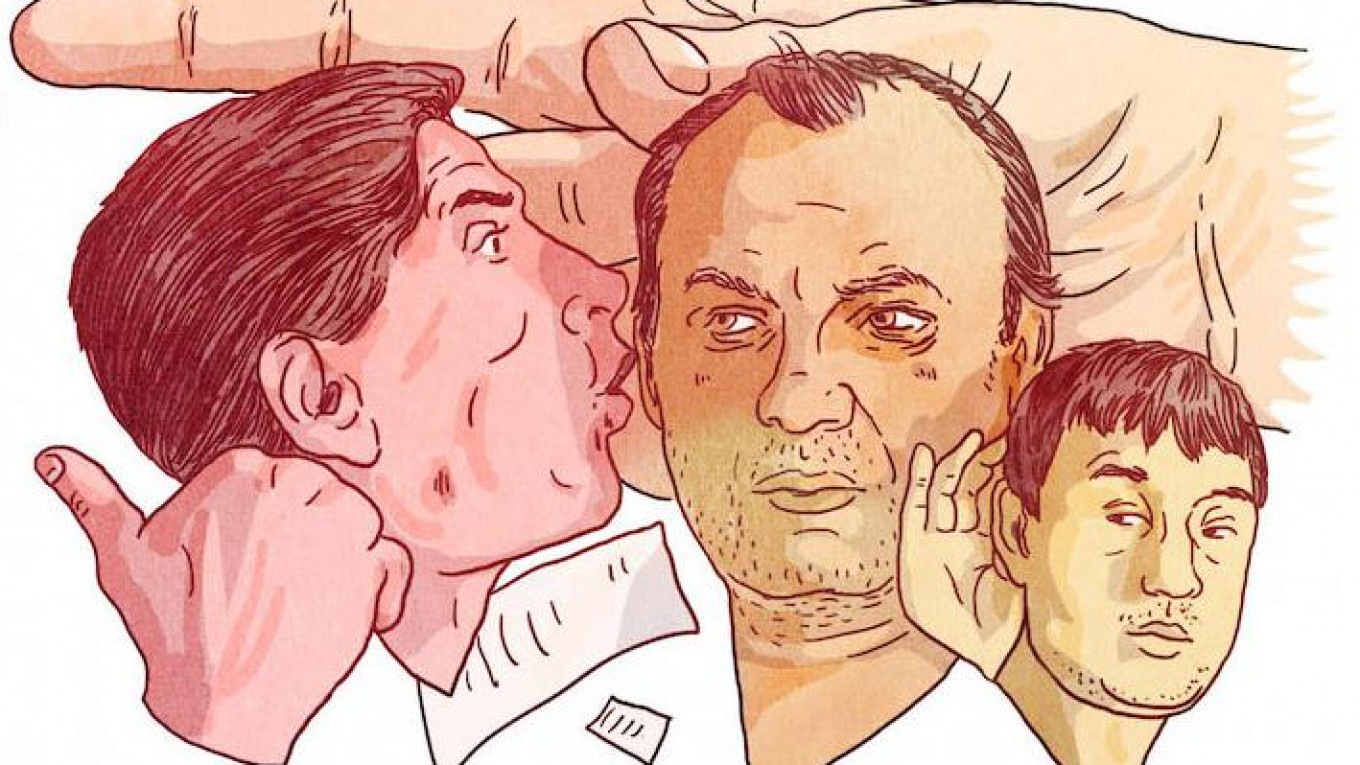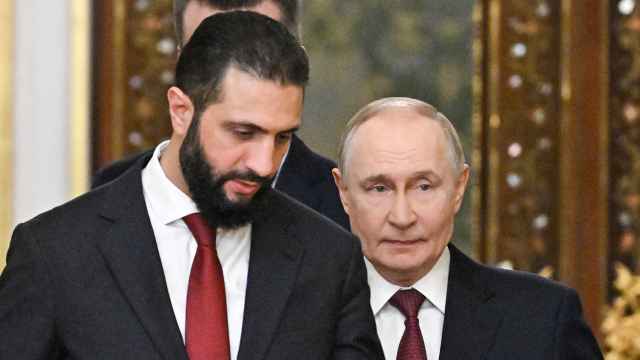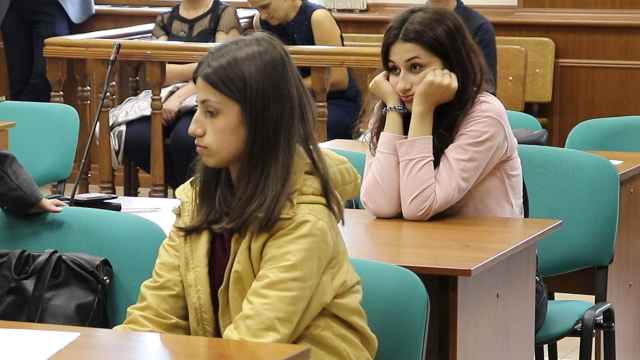The word donos — the act of ratting on someone to authorities — is a hallmark of Stalin’s Great Terror. In those troubling times, a single denunciation from a neighbor, colleague or relative was enough to have an innocent person interned in labor camps. Sometimes, worse. Donos was the foundation of society — one built on fear and the knowledge that anyone could suddenly vanish.
But donos was also a way to get ahead in life. It provided a way to deflect attention. Over time, as consequences became less severe, the power of donos faded, but it never disappeared entirely.
Today, it is making an unexpected comeback in Russia. But 21st-century informants are different. Acting in the name of conservative and fundamentalist laws, some act in search of fame, others out of personal conviction. Many combine both.
Yury Zadoya: “Culture begins with prohibition”
Yury Zadoya, chairman of the Novosibirsk branch of the conservative People’s Cathedral movement, is a thin man with a high forehead and delicate features. His voice is reminiscent of a schoolteacher.
“Culture began with prohibition,” he tells a meeting of the local Culture Ministry’s Public Council for Culture. “Russian culture has its roots in Orthodoxy and six of the 10 Commandments are prohibitory in nature, and so culture cannot be created without them” he said.
Zadoya began public activism in 2009. In quick succession, he made official complaints about the logo of a chain of sex shops, picketed ice cream ads featuring the buxom and scantily clad TV personality Anna Semenovich, and expressed outrage over ads for the Mour Mour adult club.
Then he turned his attention to Pussy Riot. It was not enough that group members Nadia Tolokonnikova and Masha Alekhina had already been imprisoned for their 2012 performance in Moscow’s Cathedral of Christ the Savior. After watching recordings of their performance, Zadoya realized he was deeply offended by their actions, and so filed a lawsuit for moral damages. He lost.
Zadoya complained about anything and everything. His was concerned by a Marilyn Manson concert, by galleries and exhibitions, by shows and operas. He was instrumental in the banning of the Wagnerian opera “Tannhauser” from the Novosibirsk Opera and Ballet Theater, as well as the firing of that theater’s director.
His work landed people in jail. When 21-year-old Siberian blogger Maxim Kormelitsky reposted photos of people holding signs with obscene inscriptions, Zadoya duly informed the local Investigative Committee that he had been offended. The blogger was given 15 months in prison.
Zadoya has filed so many lawsuits in various local courts, it is difficult for journalists to keep up with of his exploits.
Timur Isayev: “Persistent guy”
Timur Isayev entered public life in June 2013, when the State Duma passed its now-notorious law prohibiting the “promotion of non-traditional sexual relations” to minors. Isayev became prominent as a coordinator for the Head Hunters movement, and then as the founder of the organization Parents of Russia. Both groups were purportedly founded in order to protect minors.
Isayev’s first victim was Yury Vlader, a vice principal in a St. Petersburg school. Isayev’s organization claimed the Vlader had recruited a schoolteacher on the pages of an LGBT website. Isayev led anti-gay activists in a campaign of intimidation. He even descended on the teacher at his workplace. Unable to bear the pressure, Vlader quit, and Isayev recorded the first name on his list of teachers he has removed from their posts.
Soon afterward, Parents of Russia convinced officials in Magnitogorsk to fire a female teacher for reposting quotes in support of the LGBT movement. This time, the campaign of harassment lasted three months. Isayev went on to lodge complaints against a dozen more teachers in different Russian cities.
Isyaev’s organization offered rewards of 5,000 rubles [US$ 90] for information about LGBT people working in public schools. He told the Novaya Gazeta newspaper that he has helped bring about the dismissals of 67 teachers.
Isayev’s hunt for gays was interrupted only by his imprisonment in December 2014. As Isayev became prominent, state investigators recognized him as an embezzler who had been on the federal wanted list for nine years. Isayev was imprisoned for six months, before gaining his freedom through an amnesty in August 2015.
Since then, Isayev has returned to the hunt. One of the most recent victims on Isayev’s list was Maria Shestopalova, a 21-year-old music teacher from Krasnoyarsk, Siberia. After a campaign of harassment, she quit her job. Isayev had sent letters to the offices of various authorities calling her an “immoral woman” and someone who “spread the propaganda of pederasty.” One of Isayev’s complaints against Shestopalova was her piercing: “Schoolteachers cannot have tunnels in their ears or piercing on their lips,” Isayev declared.
Isayev has framed his fanaticism in terms of his religious beliefs.
“I am a Muslim. My path is jihad. I fight for the purity of our children’s surroundings,” Isayev told Novaya Gazeta. “I am simply a persistent guy in a tubeteika [Uzbek skullcap]. If I see sin, danger, and evil for our children, then I will go through all the circles of hell to take care of the problem.”
Maxim Rumyantsev: “Procedural Journalist.”
Journalist Maxim Rumyantsev owes his fame to blogger Ruslan Sokolovsky, who was controversially sent to trial for shooting a video about catching Pokemon in a church in Yekaterinburg, Russia’s third-largest city.
While associated with Sokolovsky’s misfortune, Rumyantsev did not initiate the trial himself. “I was credited with initiating the trial, but I am sorry that I was not the one who sued him first.”
Rumyantsev hosts a TV show on local networks called The Rumyantsev Case, which encourages viewers to lodge complaints about everyone and anyone. He calls his approach “procedural journalism.” According to the description of the program on the TV channel’s site, the journalist acts on any information he receives by “submitting requests and statements to authorities and agencies.”
While Sokolovsky was Rumyantsev’s most famous victim, he is certainly not his most exotic catch. That award belongs to Voodoo master Anton Simakov, who found himself subject to criminal proceedings following Rumyantsev’s procedural efforts. Basing a complaint on Article 148 of the Criminal Code ( “insulting the religious feelings of believers”), the journalist said he had been insulted when Simakov slaughtered a rooster on a shroud with a wooden crucifix. During the investigation of the criminal case, Simakov was kept in hospital for compulsory psychological treatment.
Several NGOs in the Siberian city of Chelyabinsk also fell victim to Rumyantsev’s efforts. Nadezhda Kutepova, whose “Planet of Hope” human rights NGO was listed as a foreign agent following a complaint from Rumyantsev, recalls how he pursued her throughout the city while filming his latest documentary “exposé.”
“He declared me an enemy of Russia in his film,” says the activist. “Some of the people who viewed the program even demanded that I be executed on the electric chair.”
In July 2015, Kutepova gathered her children and fled to France. “Rumyantsev trampled everything I stood for, destroyed my organization, and caused my children to suffer,” she says.
Rumyantsev, on the other hand, says he “cannot remain indifferent to legal violations.”
“True believers cannot be bribed or intimidated,” he says. “The only way to silence them is by killing them — and if that happens to me, it will be the greatest victory of my life.”
Dmitry Zakharov: “Socially responsible patriot”
Moscow city councilor Dmitry Zakharov began his patriotic campaign by identifying outlets selling alcohol illegally. In 2012, he became a co-founder of “Carriage 17,” which describes itself as “an innovative totalitarian sect” fighting against “vile enemies of this Great Country.”
What this meant in practice were flashmob “demonstrations” held ostensibly in support of sobriety, as well as disrupting any activities of those opposed to the ruling regime. Zakharov also made regular complaints to Roskomnadzor, the federal communications watchdog. He protested against alleged homosexual propaganda on the Interns TV series. He raised concerns about photographers Alexander Vasyukovich and Sergei Loiko over their work documenting Ukrainian casualties during the war in eastern Ukraine.
Zakharov was also the driving force behind a campaign against the Ukrainian Literature Library in Moscow and its director, Natalia Sharina. It was Zakharov’s complaint to Russia’s Investigative Committee about a banned “extremist” book that shuttered the library. Sharina herself now faces a criminal case and charges of extremism and misuse of funds.
“As a socially responsible patriot, I am going after the [...] Ukrainian threat,” Zakharov says. “For a Russian patriot, it isn’t about ratting, but about observing the law.”
Within the law
Herein lies the rub: However aggressive the actions of Russia’s patriotic informers, they usually fall within the boundaries of the legally permissible.
According to Daria Sukhikh, a lawyer acting for Team 29, an association of lawyers and journalists, any victim can in theory file a claim against the offender “in defense of honor, dignity, and business reputation.” If the court concludes that the denunciation was groundless and dictated by bad intentions, it can, again theoretically, make a ruling in favor of the victim.
But the opacity of many laws and articles of the Criminal Code are such that it is exceptionally difficult for someone falling victim to moral vigilantes to defend their dignity. How, for example, can someone respond to charges of offending the feelings of a believer if there is no clear definition of exactly what that means? Even if investigators do not find any concrete evidence of a crime, a case can be made that the informer is still offended.
Government and law enforcement officials rarely fail to act on vigilante denunciations, however ludicrous they might appear. The motivation for officials in these cases is understandable, says Yan Rachinsky, member of the board of the Memorial foundation: they do not want trouble and they are afraid that if they do not react they will get sacked.
At this trajectory, fear will likely remain a driving force within Russian bureaucracy. The country will remain a paradise for slanderists, careerists, and off-kilter morality champions, posised to make a name for themselves.
This story was adapted from an article first published in Novaya Gazeta.
A Message from The Moscow Times:
Dear readers,
We are facing unprecedented challenges. Russia's Prosecutor General's Office has designated The Moscow Times as an "undesirable" organization, criminalizing our work and putting our staff at risk of prosecution. This follows our earlier unjust labeling as a "foreign agent."
These actions are direct attempts to silence independent journalism in Russia. The authorities claim our work "discredits the decisions of the Russian leadership." We see things differently: we strive to provide accurate, unbiased reporting on Russia.
We, the journalists of The Moscow Times, refuse to be silenced. But to continue our work, we need your help.
Your support, no matter how small, makes a world of difference. If you can, please support us monthly starting from just $2. It's quick to set up, and every contribution makes a significant impact.
By supporting The Moscow Times, you're defending open, independent journalism in the face of repression. Thank you for standing with us.
Remind me later.






